
BOS-Executive Office
COVID-19 Response at the Hall of Administration (HOA)
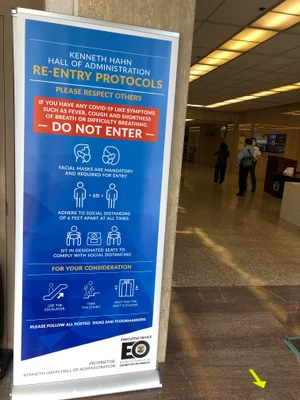
The Building Management Division with the Executive Office (EO) of the Board of Supervisors, as proprietor of the Kenneth Hanh Hall of Administration (HOA), has undertaken the role of principal lead as the health and safety agent for building during the current health crisis. The Division, in response to the initial COVID-19 developments, immediately placed Public Health available signage throughout the building and restrooms and engaged with Internal Services Department (ISD) to ensure an increase in cleaning of high-touch surfaces and response protocols for increase cleaning or COVID-19 response cleaning.
In preparation for repopulation of the HOA, social distancing floor decals, COVID-19 guideline posters and various signage were designed by EO Graphics, procured, and placed throughout the building along with providing materials to various tenant departments within the HOA . In conjunction with ISD, a plan was developed for hand sanitizer stations to be placed strategically throughout the building in accessible common areas. The objective has been raising awareness for health and safety protocols without obstructing work productivity and performance of County personnel or those who conduct business at the HOA.
Continuity of Government Through Virtual Meetings of the Board of Supervisors
On March 16, 2020, County buildings were closed to the public due to the COVID-19 pandemic. On March 31, 2020, the Executive Office of the Board of Supervisors (EO), in collaboration with the Internal Services Department (ISD), implemented virtual Board of Supervisors (BOS) meetings to facilitate Continuity of Government. Implementation of virtual BOS meeting has allowed the BOS to continue its essential functions while allowing public participation and engagement. The WebEx Meeting platform was utilized allowing Supervisors, CEO, County Counsel and Department Heads to attend remotely.
A moderator service was integrated allowing the public to call in during virtual meetings and request to speak. An electronic written Public Comment Form was also developed which can be accessed online to provide written comments on the agenda items. These written comments are made available to all Supervisors, as well as to the public via links on the agenda and become part of the official public record. Other technology enhancements include the addition of multi-language support and enabling streaming services in real time on computers, tablets, or mobile phones by leveraging social media streaming services for greater civic engagement (YouTube & Facebook Live).
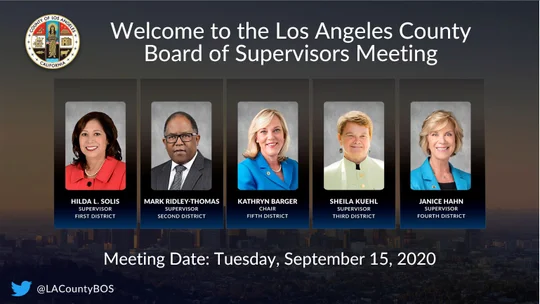
Emergency Food Security Branch

In April 2020, Tamara Hunter, Executive Director, Los Angeles County Commission for Children and Families, began serving as a manager with the Emergency Food Security Branch (EFSB). The EFSB was established to address the overwhelming level of food insecurity in Los Angeles County that was either created or exacerbated by the pandemic.
The EFSB is a small, but mighty cross-departmental team, ranging from six to eleven members at any given time. Its purview is “all things food” in the County’s COVID-19 response, and as such, the EFSB wears many hats. EFSB convenes the cross-sector, public-private Food Security Task Force; helps to troubleshoot and mitigate systemic barriers to food security; builds bridges where needed; and, designs and implements programs to provide hunger relief to the most vulnerable among us. The EFSB, in partnership with the LA Regional Food Bank, coordinates and leads food distribution events across the County, serving thousands of residents in need. The EFSB is currently in the process of developing several programs that will utilize federal CARES Act funding to address food insecurity at the organizational and individual levels, in partnership with trusted community-based organizations. Though not yet complete, Tamara’s work with the EFSB has been a humbling and truly rewarding experience.
HIV Virtual Lunch
In an effort to continue community engagement aimed at ending the HIV epidemic and connect individuals to services during the COVID-19 pandemic, the Commission on HIV (COH) launched the Virtual Lunch and Learn series to hear from local HIV service providers how the public health crisis has affected services and programs they offer, and share challenges, successes and lessons learned during these unprecedented times.
In addition, the series provided a virtual space for participants to share insights and recommendations on how to sustain the HIV movement in Los Angeles County amidst the COVID-19 pandemic. The first virtual event was held on May 13, 2020 and since then, the COH has featured a diverse group of speakers and agencies that seek to address the disproportionate impact of HIV/STDs among key populations: Black/African Americans, women of color, youth, transgender community, and justice involved individuals. Approximately over 360 individuals have participated in 9 Virtual Lunch and Learn events held since May 13. Because of the positive feedback from the community over the quality of presentations and rich discussions that have emerged from these events, the COH will continue this virtual community engagement platform in 2021.
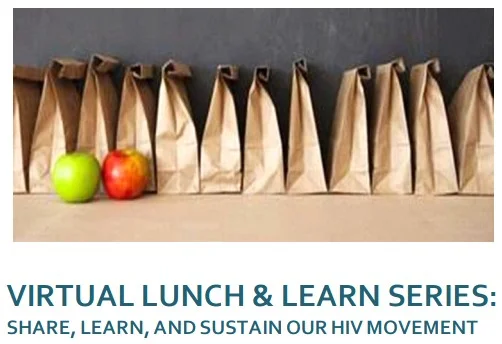
Hotel Housing During The Pandemic
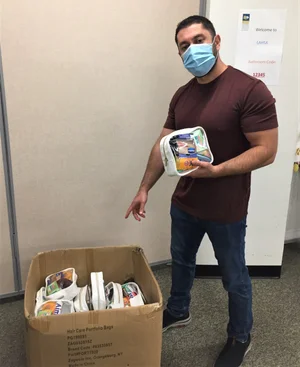
Since May, Lev Levon, Chief Board Services, has been working at the Los Angeles Homeless Services Authority (LAHSA) leading efforts to house the homeless population in County and City contrachotels. His role involves components of the entire process, including budgeting, contract monitoring, coordinating, liaising, customer service, etc. Lev’s primary role has been a Hotel/Motel Relations Coordinator working with managers and owners of hotels to ensure smooth services and roll out of operations. However, one of the most rewarding components for him has been his involvement with the “welcome bags.”
He is part of a team that receives, creates, and personalizes functional and hygienic items in a “welcome bag” for new hotel housing participants. The items in these welcome kits, donated by nonprofits or generous individuals, include a wide spectrum of essentials like deodorant, soap, laundry detergent, protein bars, socks, activity books and more. Being part of the team at LAHSA that physically carries out this effort from A to Z has made him feel the direct positive impact that essential workers from county departments are having on vulnerable populations during the pandemic.
JIC Media Relations Branch
Amid the pandemic, the Joint Information Center (JIC) Media Relations Branch, organized daily COVID-19 press conferences while maintaining a minimum number of essential staff on-site. These briefings provided critical public information while keeping in mind the health and safety of Department Heads, staffers, media members and the public.
In-person press conferences were removed and reporters’ questions were taken through a dedicated phone line. Physical distancing protocols were implemented such as 6-feet floor markings for speakers and sanitation of the microphone after each speaker’s remarks. American Sign Language (ASL) interpreters worked in real-time from distanced locations. Phone lines were created for the public to listen in to simultaneous interpretation in multiple languages including Mandarin, Korean, Spanish and English. Virtual media availabilities were hosted as needed through the Webex video conferencing platform. This was made possible with support from County staff from the Chief Executive Office (Countywide Communications & Emergency Management), Board of Supervisors (Executive Office), Consumer & Business Affairs, District Attorney, Mental Health, Parks & Recreation, Public Social Services, Public Health, Health Services & Internal Services.
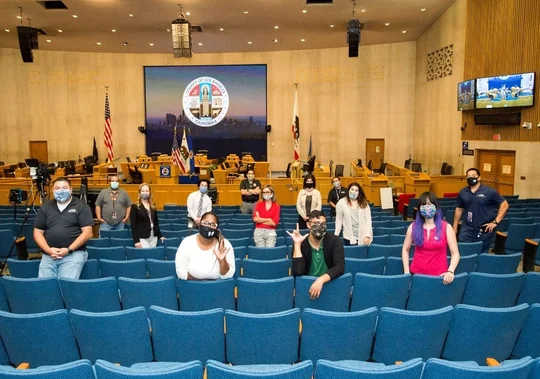
Sheraton Pomona Sheltering Site
As the coronavirus pandemic worked its way through the United States and began to affect Los Angeles County’s population, the County reached out to its workforce to help with this emergency. It asked its employees to step up to the plate and help their fellow citizens as DSWs (Disaster Service Workers) and perform various pandemic related tasks. From mid-March through late June 2020, Don Garcia served first as a Site Manager and then as the Site Director for the County’s largest Medical Sheltering Site at the Sheraton-Pomona.
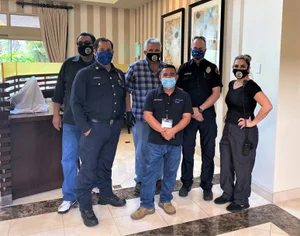
The Sheraton Fairplex Hotel in Pomona was converted from a hotel to a medical sheltering site serving people experiencing homelessness and anyone who could not safely isolate or quarantine in their own home testing positive for COVID. Don and his team of DSWs were responsible for all logistical aspects of converting the Sheraton to a fully functioning emergency housing site. From housekeeping, meal service, janitorial, building maintenance, supply ordering and seeing to it that Centers for Disease Control guidelines were put in place to make sure the site was properly sanitized to eliminate the spread of the virus within the property. It was a pleasure and a privilege for Don working with such dedicated DSWs working on the COVID-19 front lines.
Virtual Civil Service Commission Hearings
As a result of the restrictions put in place by the COVID-19 pandemic, the Civil Service Commission (CSC) was confronted with the challenge of pivoting from in-person hearings and meetings to creating and implementing an all virtual format. Staff worked tirelessly over the course of a month to fast track this project with the help of Information Resource Management (IRM), stakeholders, Commissioners, and County Counsel to develop a virtual Commission meeting format that would allow the CSC to continue providing parties with the ability to have their cases adjudicated in a fair and consistent manner. These virtual commission meetings have been up and running since May 2020 and the CSC has received much praise from the parties appearing for this innovative solution to an unprecedented problem.
The CSC is currently working on the implementation of virtual hearings which will go live on October 1, 2020. While the Commission is positive there will be the inevitable growing pains the process is ramped up, it will serve as a valuable tool for the administration of hearings and providing parties with the ability to seek a resolution to their cases expeditiously.
